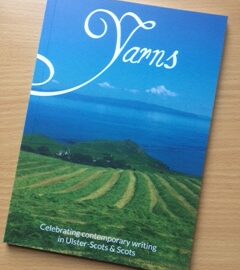In time for Ulster-Scots Language Week (22nd – 27th November) the Ulster-Scots Community Network has brought out a very welcome collection of prose and poetry. The work of 25 writers, a few writing in Scots, is represented here. It bills itself as ‘celebrating contemporary writing’ in both tongues.
I am very pleased to have 2 poems and an extract from my novel-in-progress Thoarn included.
The significance of this publication is that it sets today’s writers in Ulster-Scots firmly under the spotlight. Is the writing genuinely ‘contemporary’? How wide is the range of style and of subject-matter? What is the gender balance? What hope does it give that there is more high-calibre work to follow on?
The main editor, Dr Frank Ferguson stresses in his introduction that he sees the book as a spring-board.
‘Evidence of so many committed to their work begs the question of how we might work towards fanning single poems to pamphlets and collection…’
‘Such creative verve, as displayed in this collection requires recognition, support and nurturing from tha mainstream.’
Indeed, it does need such support and this collection demonstrates why such help is deserved.
Such support from the mainstream presumably means that Ulster-Scots will want to enter that mainstream, claiming its place – or rather re-claiming its place – in the literature of the island and beyond. This means taking advantage of a developing openness to multi-lingual publication.
The last two years have seen a marked increase in the publication of new Ulster-Scots work. For instance, a year ago, Steve Dornan’s stylistically ambitious Tha Jaa Banes was brought out by the Ulster-Scots Language Society.
The Ulster-Scots elements in Anne McMaster’s moving poetry collection Walking Off The Land were rightly welcomed by her publisher Hedgehog Press. One of my poems in ‘Yarns’ was first published (in an earlier version) in the English-language Bangor Literary Journal. I found no editorial barrier to submitting in Ulster-Scots. In my collection of short stories, A City Burning the Welsh publisher did not baulk at including a story with an Ulster-Scots-speaking character.
The resistance to multi-lingualism has lessened. For instance, I notice poems in Irish appearing in collections from Welsh publisher Black Bough Poems. I see a welcome drive towards fostering the creative expression of writers who are among our newer citizens, bringing non-European languages to our cultural life. Today’s editor is increasingly likely to be presented with work in languages other than English.
A striking example is Arachne Press’s bilingual Welsh/English poetry anthologies such as the upcoming A470
and its anthology What Meets The Eye – poems, short fiction and scripts from UK Deaf, deaf and Hard of Hearing writers in which another language, British Sign Language, shares the stage.
Multi-lingual publishing requires, of course, additional editorial expertise and it demands more of critics, and readers. It’s not too much to expect publishing to reflect the society – the writers and readers – it springs from.
It’s heartening that during Ulster-Scots Langauge Week 22 – 27th November the theme of the workshop for writers in Ulster-Scots is Future Tense
That is, Scots / Ulster-Scots as a language of the now, of evolution of all its speakers of all ages, and its words and relation to the modern world.
Yarns is available from [email protected] or [email protected]
